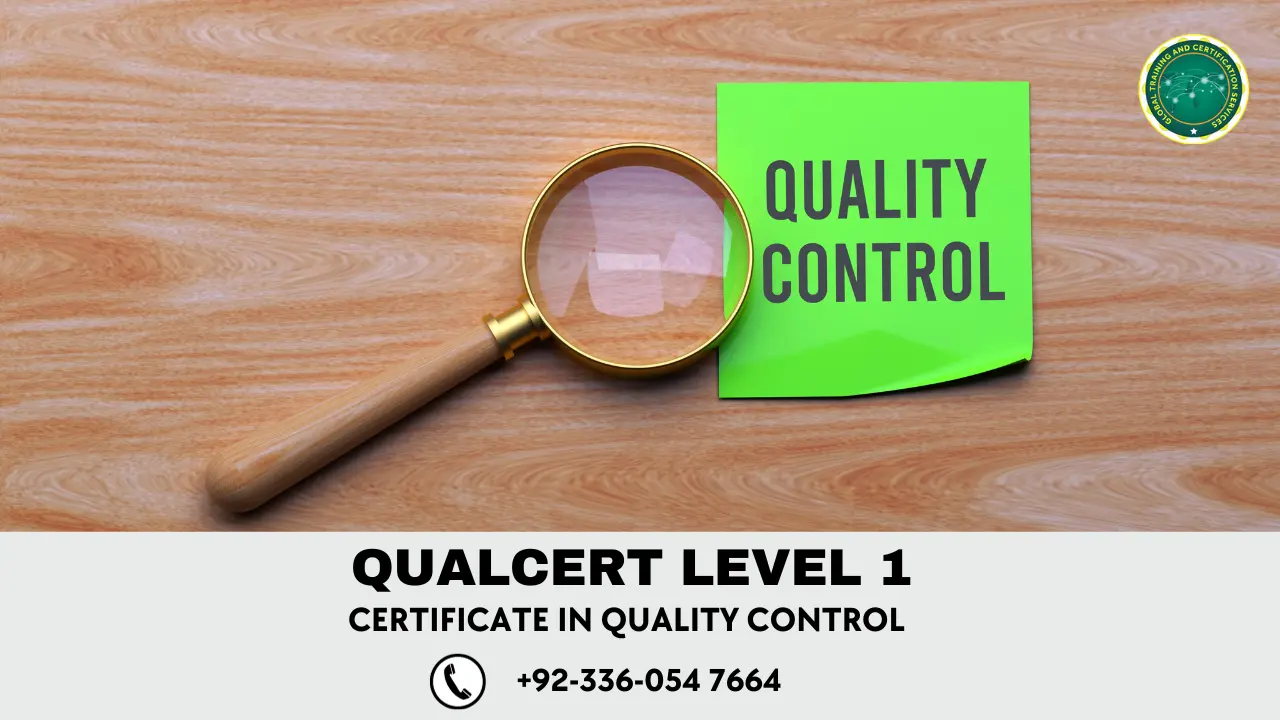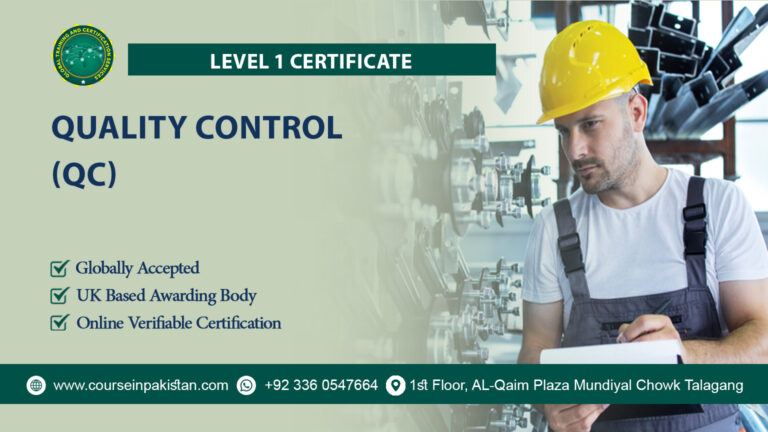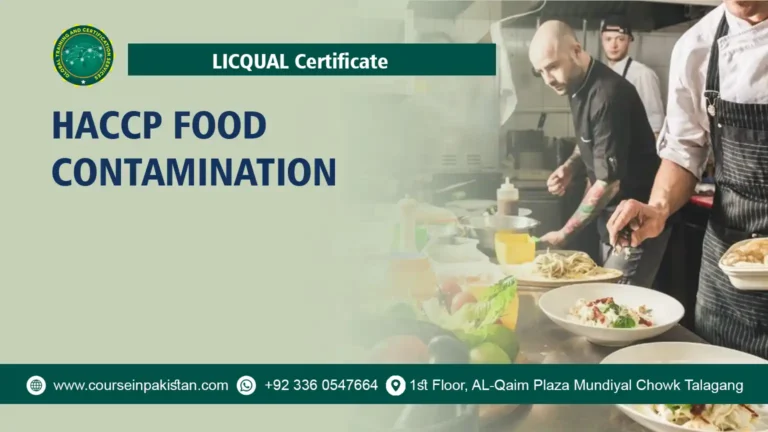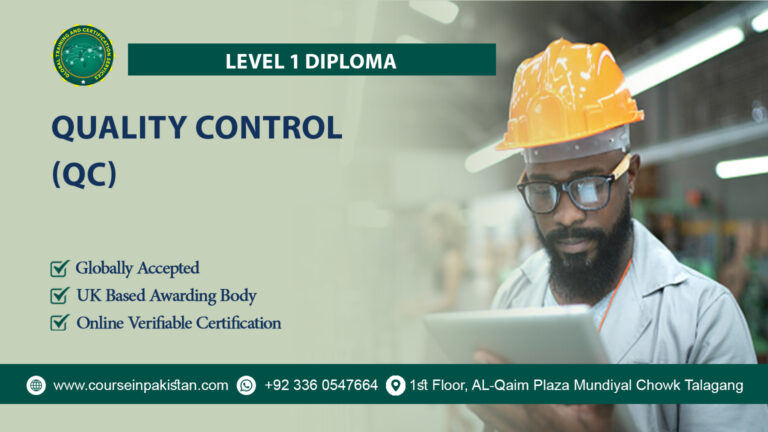
Level 1 Certificate in Quality Control (QC)
“Empowering Futures through Excellence in Quality Control – Level 1”
Are you ready to take your career to new heights? Dreaming of a future filled with exciting opportunities, impressive job titles, and a steady climb up the corporate ladder? Look no further – the Level 1 Certificate in Quality Control is your passport to success!
Why Choose Level 1 Certificate in Quality Control (QC)
- Fundamental Understanding: The Level 1 Certificate in QC provides a solid foundation in quality control principles and practices. It is an ideal starting point for those who are new to the field, ensuring that you grasp essential concepts and terminology.
- Career Advancement: Earning this certificate can open up new career opportunities and pathways. It is often a prerequisite for entry-level positions in quality control and quality assurance, making it an essential qualification for those aspiring to excel in this field.
- Industry Recognition: Many industries, including manufacturing, healthcare, and technology, highly value quality control professionals. Holding a Level 1 QC certificate can demonstrate your commitment to quality and make you stand out to employers.
- Improved Job Performance: The knowledge and skills acquired through this certification can directly enhance your on-the-job performance. You’ll be better equipped to identify and address quality issues, contributing to higher product or service standards.
- Quality Improvement: By understanding the fundamentals of quality control, you can contribute to improving processes, reducing defects, and enhancing overall product or service quality within your organization.
Your Future Awaits – Enroll Today!
The Level 1 Certificate in Quality Control (QC) is an introductory certification program designed to provide individuals with fundamental knowledge and skills in the field of quality control. Quality control is a critical aspect of various industries, including manufacturing, healthcare, construction, and many others, where maintaining and improving the quality of products or services is essential.
The Level 1 Certificate in Quality Control (QC) offers numerous benefits for individuals and organizations alike. Here are some of the key advantages:
Enhanced Quality Assurance: The Level 1 QC certificate equips professionals with fundamental skills and knowledge in quality control, enabling them to ensure products and processes meet established quality standards. This contributes to higher-quality outputs and increased customer satisfaction.
Career Advancement: Holding a Level 1 QC certificate can open doors to various career opportunities in industries where quality control is critical, such as manufacturing, healthcare, and technology. It can also serve as a stepping stone for further education and advanced certifications in quality management.
Improved Problem-Solving Skills: QC professionals learn how to identify and address quality-related issues effectively. This skill is invaluable for troubleshooting problems, reducing defects, and optimizing processes.
Cost Savings: Through effective quality control practices, organizations can reduce waste, rework, and warranty claims. This leads to cost savings and improved profitability in the long run.
Compliance and Standards: Professionals with Level 1 QC certification are well-versed in industry-specific standards and regulations. This knowledge ensures that organizations remain compliant with relevant quality standards and avoid legal and regulatory issues.
Risk Mitigation: By proactively identifying and rectifying quality issues, businesses can minimize the risks associated with product recalls, customer complaints, and reputation damage.
Customer Satisfaction: Delivering consistently high-quality products or services enhances customer trust and satisfaction. Satisfied customers are more likely to become repeat buyers and brand advocates.
Team Collaboration: QC professionals often work closely with cross-functional teams, promoting collaboration and communication within an organization. This interdisciplinary approach can lead to better problem-solving and decision-making.
Global Recognition: Many Level 1 QC programs are recognized internationally, making it easier for professionals to work in different regions and countries. This can broaden career prospects and opportunities for international collaboration.
Continuous Improvement: QC professionals are trained to adopt a mindset of continuous improvement. They regularly assess processes, gather data, and implement changes to enhance quality, efficiency, and effectiveness.
Personal Development: Pursuing a Level 1 QC certificate not only benefits organizations but also contributes to personal growth. Individuals develop critical thinking, analytical, and leadership skills that are valuable in various aspects of life.
Competitive Advantage: Organizations with a skilled QC team that holds Level 1 certifications often have a competitive edge in the market. They can differentiate themselves by offering superior quality products or services.
Upon successful completion of this program, learners will have achieved the following learning to :
- Basic Understanding of Quality Control: Students will gain a fundamental understanding of what quality control is and why it is important in various industries.
- Quality Control Terminology: Familiarize students with key terminology used in quality control, such as defects, non-conformance, specifications, and standards.
- Statistical Tools: Introduce students to basic statistical tools used in quality control, including histograms, control charts, and process capability analysis.
- Inspection Techniques: Develop the ability to perform visual inspections, measurements, and testing as part of quality control processes.
- Documentation Skills: Teach students how to accurately document quality control processes, including record-keeping and data analysis.
- Quality Standards: Provide an overview of industry-specific quality standards and regulations relevant to quality control in various sectors.
- Problem Identification: Equip students with the skills to identify and recognize common quality problems and defects in products or processes.
- Root Cause Analysis: Introduce students to root cause analysis techniques to determine the underlying causes of quality issues.
- Process Improvement: Instill the principles of continuous improvement and quality enhancement within organizations.
- Communication Skills: Enhance students’ ability to communicate quality-related issues effectively within a team or organization.
- Safety in Quality Control: Emphasize the importance of safety measures and protocols in quality control processes to ensure the well-being of workers and consumers.
- Ethical Considerations: Discuss ethical considerations related to quality control, such as honesty, integrity, and transparency in reporting findings.
- Quality Control Tools and Software: Familiarize students with software and tools commonly used in quality control, such as quality management software and data analysis tools.
- Hands-On Practice: Provide opportunities for hands-on practice and real-world application of quality control principles through practical exercises and case studies.
- Quality Control Reporting: Teach students how to prepare quality control reports and present findings to relevant stakeholders.
- Teamwork and Collaboration: Foster collaboration and teamwork skills necessary for effective quality control efforts within organizations.
- Quality Control Regulations: Explore national and international regulations and standards relevant to quality control in specific industries.
- Quality Control in Manufacturing/Service: Differentiate between quality control processes in manufacturing and service industries, if applicable.
- Quality Control in Supply Chain: Understand the role of quality control in supply chain management and supplier relationships.
- Professionalism: Encourage professionalism and a commitment to maintaining high standards of quality throughout one’s career.
The Level 1 Certificate in Quality Control serves as an essential foundation for individuals seeking to embark on a career in quality management and control. This certification is significant for several reasons:
- Introduction to Quality Principles: The Level 1 Certificate provides a comprehensive introduction to the fundamental principles of quality control. It covers key concepts, terminology, and methodologies that are essential for understanding and implementing quality management systems.
- Entry-Level Qualification: It serves as an entry-level qualification for those who are new to the field of quality control. This makes it accessible to individuals with little to no prior experience, allowing them to start their journey in this career path.
- Career Advancement: For individuals already working in quality-related roles, obtaining the Level 1 Certificate can enhance their career prospects. It demonstrates a commitment to professional development and can open doors to higher-level positions within quality control and assurance.
- Industry Recognition: The Level 1 Certificate is often recognized by employers across various industries. It serves as a credible validation of an individual’s knowledge and skills in quality control, making them a more attractive candidate for quality-related job opportunities.
- Skill Enhancement: Through this certification, individuals acquire practical skills in quality control, including data analysis, process improvement, and problem-solving. These skills are transferable and can be applied in a wide range of industries and settings.
- Quality Improvement: Quality control is critical for organizations aiming to improve their products and services. The Level 1 Certificate equips individuals with the tools and techniques needed to contribute to quality improvement initiatives within their organizations.
- Global Relevance: Quality control principles are applicable globally, making the Level 1 Certificate a valuable credential for individuals who aspire to work in international settings or for multinational companies.
- Compliance and Standards: Many industries have strict quality standards and regulations. The Level 1 Certificate helps individuals understand and comply with these standards, ensuring that products and processes meet the required quality criteria.
- Continuous Learning: It encourages individuals to engage in continuous learning and professional development. Quality control is an evolving field, and staying up-to-date with the latest practices and technologies is essential for success.
Course Contents of Level 1 Certificate in Quality Control (QC)
Module 1: Introduction to Quality Control
- Understanding Quality: Definition and Importance
- Historical Overview of Quality Control
- Quality Control vs. Quality Assurance
Module 2: Basic Quality Concepts
- Quality Characteristics and Attributes
- Common Quality Terminology
- The Cost of Poor Quality
Module 3: Quality Control Tools and Techniques
- Statistical Process Control (SPC)
- Data Collection and Analysis
- Control Charts and Graphical Methods
Module 4: Quality Standards and Regulations
- Industry-Specific Quality Standards (e.g., ISO 9001)
- Regulatory Compliance and Quality
- Quality Auditing
Module 5: Inspection and Testing Methods
- Inspection Methods and Procedures
- Sampling Techniques (e.g., Random Sampling, Stratified Sampling)
- Measurement and Testing Equipment
Module 6: Documentation and Reporting
- Record Keeping and Documentation Requirements
- Reporting Quality Control Findings
- Non-conformance Reporting and Corrective Actions
Module 7: Quality and Safety
- Safety Considerations in Quality Control
- The Interplay between Safety and Quality
- Ensuring Safe Quality Control Practices
Module 8: Quality Control in Practice
- Case Studies and Real-World Applications
- Quality Control in Various Industries (e.g., Manufacturing, Healthcare, Food)
Module 9: Quality Control Skills Development
- Problem-Solving Techniques
- Teamwork and Communication in Quality Control
- Practical Exercises and Simulations
Module 10: Final Assessment and Certification
- Written Examinations
- Practical Assessments
- Certification and Recognition
The Level 1 Certificate in Quality Control is designed for individuals who are looking to build a foundational understanding of quality control principles and practices. This course is suitable for:
- Entry-Level Professionals: If you are new to the field of quality control and want to kickstart your career, this course provides essential knowledge and skills.
- Quality Control Technicians: Current quality control technicians or inspectors seeking to formalize their knowledge and improve their career prospects will benefit from this certification.
- Manufacturing Workers: Individuals working in manufacturing industries who want to contribute to improving product quality and efficiency will find this course valuable.
- Supervisors and Managers: Supervisors and managers who oversee quality control processes can gain a better understanding of the fundamentals to enhance their leadership and decision-making.
- Students and Recent Graduates: Students pursuing degrees in fields related to quality control, as well as recent graduates, can use this course to supplement their academic knowledge and increase their employability.
- Career Changers: If you’re considering a career change into quality control or a related field, this course can serve as a solid introduction.
- Small Business Owners: Small business owners who want to improve the quality of their products or services can benefit from the knowledge gained in this course.
- Anyone Interested in Quality Improvement: If you have a general interest in quality improvement and want to learn the basics, this course is accessible and informative.
Entry Requirements for the Level 1 Certificate in Quality Control (QC) Course
To ensure that participants can effectively engage with and benefit from the Level 1 Certificate in Quality Control (QC) course, we have established the following entry requirements:
- Educational Background: While there may not be strict educational prerequisites, participants should generally have a high school diploma or equivalent educational qualifications. This ensures that individuals have basic literacy and numeracy skills.
- Language Proficiency: Proficiency in the language of instruction (usually English) is essential to comprehend course materials, participate in discussions, and complete written assignments.
- Age Requirement: Participants must be at least 18 years of age to enroll in this course.
- No Previous QC Experience Required: This course is designed to accommodate both beginners and professionals seeking to refresh their knowledge. No prior experience in quality control is necessary.
To take admission in Based Computer course, Please visit our institute
Global Training and Certification Services
1st Floor, Al-Qaim Plaza, Mundiyal Chowk, Talagang
For any query or detailed information please call us on
+92-336-054 7664
For WhatsApp Please







